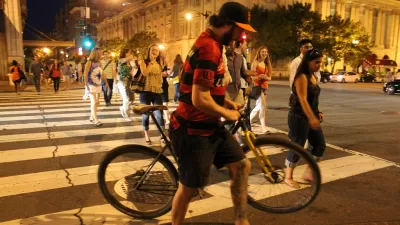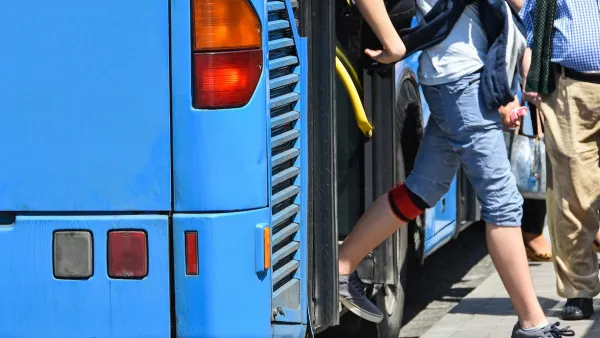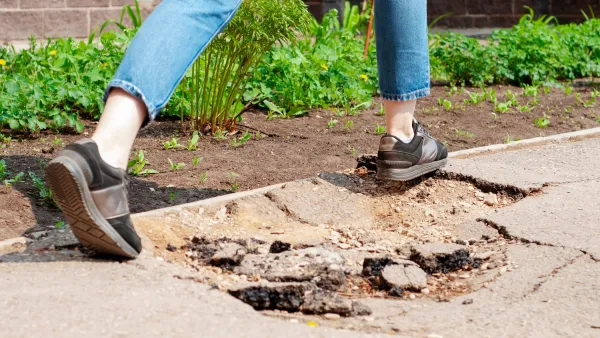Generally speaking, bikes on sidewalks are not a good idea, but a federally funded project in Duluth, Minnesota may cause planners to take a second look at the practice.
Sidewalk widenings in downtowns have generally been done for commercial purposes, e.g., Castro Street streetscape improvement in San Francisco, Burlingame Avenue streetscape improvement in a suburb just south of the city, and California Avenue sidewalk widening in Palo Alto.
Other than adding new bike racks to the widened sidewalks, the idea was to accommodate more pedestrians, add al fresco dining, and generally make the business districts more inviting and walkable. So it was interesting to see a midwestern sidewalk widening project, financed in part with a federal grant, no less, design the project from a multimodal perspective.
"Eight to 10 feet wide and surfacing in strategic locations in Duluth, a transportation evolution is arriving this summer with the advent of what St. Louis County engineers are calling 'super sidewalks,'" reports Forum News Service for the The Bemidji Pioneer.
“They’re wide, so you can have somebody Rollerblading and biking and passing each other with plenty of room,” said Steve Krasaway, resident engineer of a 1.7-mile stretch of Rice Lake Road that’s currently being outfitted with a super sidewalk beginning at Marshall School.
The $1.1 million project is being funded with federal money and transportation sales tax revenue, a county news release said last month.
Improving bicycling safety by ceding roads to cars?
“I’m excited to see this kind of safe, separated place for people to ride bikes,” said Brian Downing, 28, of Duluth, who is a member of the Duluth Bikes advocacy group and the Healthy Duluth Area Coalition
“Everybody can use them at the same time with no conflicts, and it keeps them off the road,” added Krasaway.
Duluth was rated as Bicycle Friendly Community by the Bicycle Alliance of Minnesota in 2014.
A recent Planetizen feature addressed the controversial issue of Bicyclists on Sidewalks: Why They're Not Going Away, and What We Can Do About It."
An earlier post based on an op-ed co-written by PeopleForBikes and America Walks suggested the best way to get bikes off sidewalks was to construct protected bicycle lanes.
FULL STORY: Duluth installing ‘super sidewalks’ for pedestrians, bikers to share

Planetizen Federal Action Tracker
A weekly monitor of how Trump’s orders and actions are impacting planners and planning in America.

Maui's Vacation Rental Debate Turns Ugly
Verbal attacks, misinformation campaigns and fistfights plague a high-stakes debate to convert thousands of vacation rentals into long-term housing.

San Francisco Suspends Traffic Calming Amidst Record Deaths
Citing “a challenging fiscal landscape,” the city will cease the program on the heels of 42 traffic deaths, including 24 pedestrians.

Defunct Pittsburgh Power Plant to Become Residential Tower
A decommissioned steam heat plant will be redeveloped into almost 100 affordable housing units.

Trump Prompts Restructuring of Transportation Research Board in “Unprecedented Overreach”
The TRB has eliminated more than half of its committees including those focused on climate, equity, and cities.

Amtrak Rolls Out New Orleans to Alabama “Mardi Gras” Train
The new service will operate morning and evening departures between Mobile and New Orleans.
Urban Design for Planners 1: Software Tools
This six-course series explores essential urban design concepts using open source software and equips planners with the tools they need to participate fully in the urban design process.
Planning for Universal Design
Learn the tools for implementing Universal Design in planning regulations.
Heyer Gruel & Associates PA
JM Goldson LLC
Custer County Colorado
City of Camden Redevelopment Agency
City of Astoria
Transportation Research & Education Center (TREC) at Portland State University
Jefferson Parish Government
Camden Redevelopment Agency
City of Claremont





























